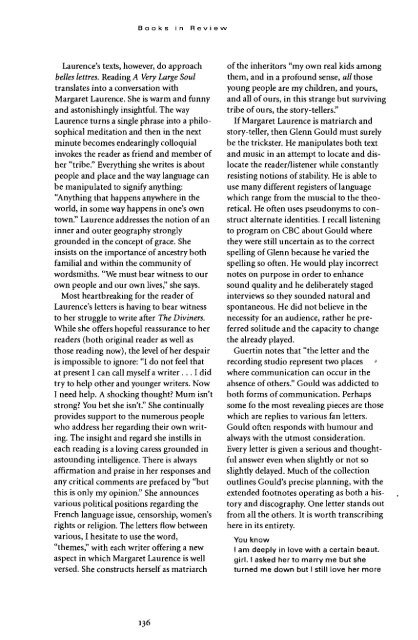Jean Rivard - University of British Columbia
Jean Rivard - University of British Columbia
Jean Rivard - University of British Columbia
You also want an ePaper? Increase the reach of your titles
YUMPU automatically turns print PDFs into web optimized ePapers that Google loves.
Books in Review<br />
Laurence's texts, however, do approach<br />
belles lettres. Reading A Very Large Soul<br />
translates into a conversation with<br />
Margaret Laurence. She is warm and funny<br />
and astonishingly insightful. The way<br />
Laurence turns a single phrase into a philosophical<br />
meditation and then in the next<br />
minute becomes endearingly colloquial<br />
invokes the reader as friend and member <strong>of</strong><br />
her "tribe." Everything she writes is about<br />
people and place and the way language can<br />
be manipulated to signify anything:<br />
"Anything that happens anywhere in the<br />
world, in some way happens in one's own<br />
town." Laurence addresses the notion <strong>of</strong> an<br />
inner and outer geography strongly<br />
grounded in the concept <strong>of</strong> grace. She<br />
insists on the importance <strong>of</strong> ancestry both<br />
familial and within the community <strong>of</strong><br />
wordsmiths. "We must bear witness to our<br />
own people and our own lives," she says.<br />
Most heartbreaking for the reader <strong>of</strong><br />
Laurence's letters is having to bear witness<br />
to her struggle to write after The Diviners.<br />
While she <strong>of</strong>fers hopeful reassurance to her<br />
readers (both original reader as well as<br />
those reading now), the level <strong>of</strong> her despair<br />
is impossible to ignore: "I do not feel that<br />
at present I can call myself a writer ... I did<br />
try to help other and younger writers. Now<br />
I need help. A shocking thought? Mum isn't<br />
strong? You bet she isn't." She continually<br />
provides support to the numerous people<br />
who address her regarding their own writing.<br />
The insight and regard she instills in<br />
each reading is a loving caress grounded in<br />
astounding intelligence. There is always<br />
affirmation and praise in her responses and<br />
any critical comments are prefaced by "but<br />
this is only my opinion." She announces<br />
various political positions regarding the<br />
French language issue, censorship, women's<br />
rights or religion. The letters flow between<br />
various, I hesitate to use the word,<br />
"themes," with each writer <strong>of</strong>fering a new<br />
aspect in which Margaret Laurence is well<br />
versed. She constructs herself as matriarch<br />
<strong>of</strong> the inheritors "my own real kids among<br />
them, and in a pr<strong>of</strong>ound sense, all those<br />
young people are my children, and yours,<br />
and all <strong>of</strong> ours, in this strange but surviving<br />
tribe <strong>of</strong> ours, the story-tellers."<br />
If Margaret Laurence is matriarch and<br />
story-teller, then Glenn Gould must surely<br />
be the trickster. He manipulates both text<br />
and music in an attempt to locate and dislocate<br />
the reader/listener while constantly<br />
resisting notions <strong>of</strong> stability. He is able to<br />
use many different registers <strong>of</strong> language<br />
which range from the muscial to the theoretical.<br />
He <strong>of</strong>ten uses pseudonyms to construct<br />
alternate identities. I recall listening<br />
to program on CBC about Gould where<br />
they were still uncertain as to the correct<br />
spelling <strong>of</strong> Glenn because he varied the<br />
spelling so <strong>of</strong>ten. He would play incorrect<br />
notes on purpose in order to enhance<br />
sound quality and he deliberately staged<br />
interviews so they sounded natural and<br />
spontaneous. He did not believe in the<br />
necessity for an audience, rather he preferred<br />
solitude and the capacity to change<br />
the already played.<br />
Guertin notes that "the letter and the<br />
recording studio represent two places ·><br />
where communication can occur in the<br />
absence <strong>of</strong> others." Gould was addicted to<br />
both forms <strong>of</strong> communication. Perhaps<br />
some fo the most revealing pieces are those<br />
which are replies to various fan letters.<br />
Gould <strong>of</strong>ten responds with humour and<br />
always with the utmost consideration.<br />
Every letter is given a serious and thoughtful<br />
answer even when slightly or not so<br />
slightly delayed. Much <strong>of</strong> the collection<br />
outlines Gould's precise planning, with the<br />
extended footnotes operating as both a history<br />
and discography. One letter stands out<br />
from all the others. It is worth transcribing<br />
here in its entirety.<br />
You know<br />
I am deeply in love with a certain beaut,<br />
girl. I asked her to marry me but she<br />
turned me down but I still love her more<br />
136

















